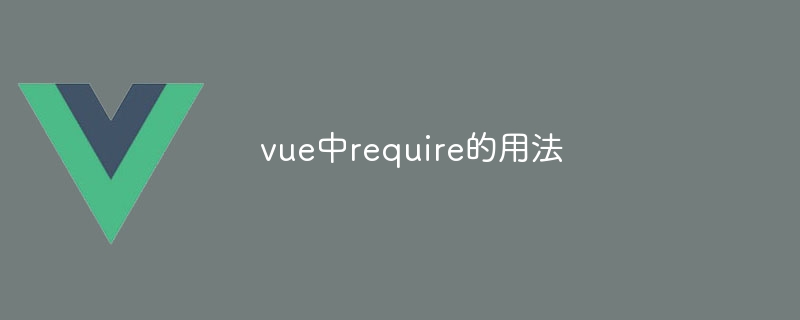How to use require in vue
The require method in Vue can import external JavaScript modules and CSS files into the Vue component: Import JavaScript modules: use require('module-name'); Import CSS files: use require('./styles. css');, the style will be automatically applied to the current component.

Usage of require in Vue
Use Vue’s require method to import external JavaScript Modules and CSS files into Vue components.
Syntax
const module = require('module-name');Import JavaScript module
require can be used to import JavaScript modules, and Expose the module to the current component. For example:
// 导入 lodash 模块
const _ = require('lodash');
// 使用 lodash
const sorted = _.sortBy(data, 'name');Import CSS file
require can also be used to import CSS files and apply styles to the current component. For example:
// 导入 styles.css 文件
require('./styles.css');
// 样式将自动应用到当前组件Hot Module Refresh
During development, require can be combined with the Hot Module Refresh (HMR) feature to update files when Automatically update components when they change. For example:
// 启用 HMR
if (module.hot) {
module.hot.accept('./styles.css', () => {
// 当 styles.css 发生更改时,重新加载样式
require('./styles.css');
});
}Notes
-
requireThe method only runs when the component is initialized. -
requireThe imported module will be used as a dependency of the component and will be automatically recycled when the component is destroyed. - If the module name does not contain a file extension,
requirewill automatically try the.jsand.vueextensions.
The above is the detailed content of How to use require in vue. For more information, please follow other related articles on the PHP Chinese website!

Hot AI Tools

Undresser.AI Undress
AI-powered app for creating realistic nude photos

AI Clothes Remover
Online AI tool for removing clothes from photos.

Undress AI Tool
Undress images for free

Clothoff.io
AI clothes remover

AI Hentai Generator
Generate AI Hentai for free.

Hot Article

Hot Tools

Notepad++7.3.1
Easy-to-use and free code editor

SublimeText3 Chinese version
Chinese version, very easy to use

Zend Studio 13.0.1
Powerful PHP integrated development environment

Dreamweaver CS6
Visual web development tools

SublimeText3 Mac version
God-level code editing software (SublimeText3)

Hot Topics
 How to use echarts in vue
May 09, 2024 pm 04:24 PM
How to use echarts in vue
May 09, 2024 pm 04:24 PM
Using ECharts in Vue makes it easy to add data visualization capabilities to your application. Specific steps include: installing ECharts and Vue ECharts packages, introducing ECharts, creating chart components, configuring options, using chart components, making charts responsive to Vue data, adding interactive features, and using advanced usage.
 The role of export default in vue
May 09, 2024 pm 06:48 PM
The role of export default in vue
May 09, 2024 pm 06:48 PM
Question: What is the role of export default in Vue? Detailed description: export default defines the default export of the component. When importing, components are automatically imported. Simplify the import process, improve clarity and prevent conflicts. Commonly used for exporting individual components, using both named and default exports, and registering global components.
 How to use map function in vue
May 09, 2024 pm 06:54 PM
How to use map function in vue
May 09, 2024 pm 06:54 PM
The Vue.js map function is a built-in higher-order function that creates a new array where each element is the transformed result of each element in the original array. The syntax is map(callbackFn), where callbackFn receives each element in the array as the first argument, optionally the index as the second argument, and returns a value. The map function does not change the original array.
 The role of onmounted in vue
May 09, 2024 pm 02:51 PM
The role of onmounted in vue
May 09, 2024 pm 02:51 PM
onMounted is a component mounting life cycle hook in Vue. Its function is to perform initialization operations after the component is mounted to the DOM, such as obtaining references to DOM elements, setting data, sending HTTP requests, registering event listeners, etc. It is only called once when the component is mounted. If you need to perform operations after the component is updated or before it is destroyed, you can use other lifecycle hooks.
 What are hooks in vue
May 09, 2024 pm 06:33 PM
What are hooks in vue
May 09, 2024 pm 06:33 PM
Vue hooks are callback functions that perform actions on specific events or lifecycle stages. They include life cycle hooks (such as beforeCreate, mounted, beforeDestroy), event handling hooks (such as click, input, keydown) and custom hooks. Hooks enhance component control, respond to component life cycles, handle user interactions and improve component reusability. To use hooks, just define the hook function, execute the logic and return an optional value.
 What scenarios can event modifiers in vue be used for?
May 09, 2024 pm 02:33 PM
What scenarios can event modifiers in vue be used for?
May 09, 2024 pm 02:33 PM
Vue.js event modifiers are used to add specific behaviors, including: preventing default behavior (.prevent) stopping event bubbling (.stop) one-time event (.once) capturing event (.capture) passive event listening (.passive) Adaptive modifier (.self)Key modifier (.key)
 How to set unknown attributes in vscode vscode method to set unknown attributes
May 09, 2024 pm 02:43 PM
How to set unknown attributes in vscode vscode method to set unknown attributes
May 09, 2024 pm 02:43 PM
1. First, open the settings icon in the lower left corner and click the settings option. 2. Then, find the CSS column in the jumped window. 3. Finally, change the drop-down option in the unknownproperties menu to the error button.
 Promise usage in vue
May 09, 2024 pm 03:27 PM
Promise usage in vue
May 09, 2024 pm 03:27 PM
Promise can be used to handle asynchronous operations in Vue.js. The steps include: creating a Promise object, performing an asynchronous operation and calling resolve or reject based on the result, and processing the Promise result (use .then() to handle success, .catch() to handle errors) . Advantages of Promises include readability, ease of debugging, and composability.






